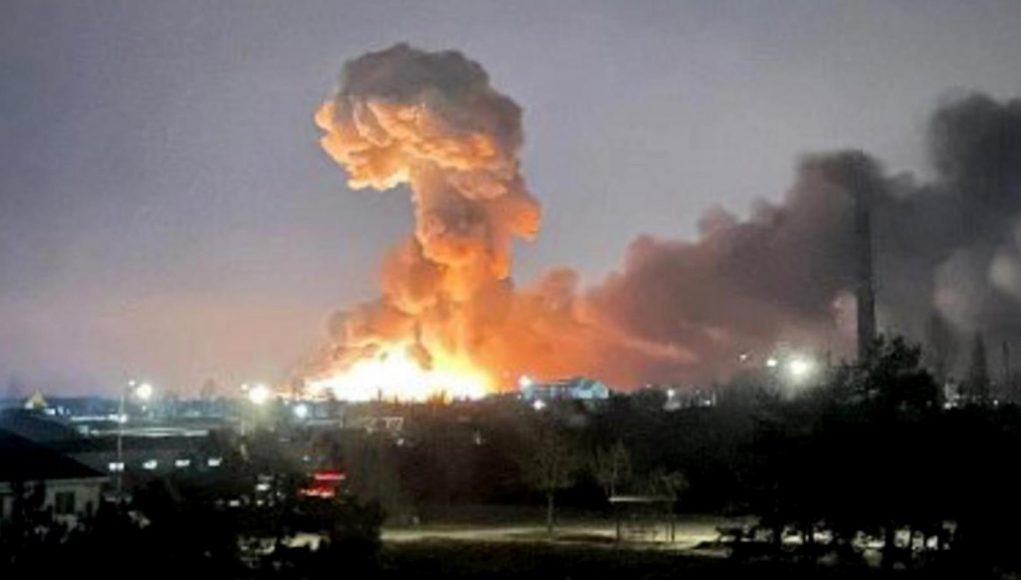Russia-Ukraine war: A law lecturer’s perspective
A Law lecturer at the Faculty of Law at the Wisconsin International University and the Lancaster Law Faculty, George Acquah (Esq) had this to say when contacted by Dennislaw News;

On Thursday, February 24, 2022, Russia launched an attack on Ukrainian cities and military installations after Vladimir Putin defied international condemnations and likely sanctions.
In a state broadcast, the Russian leader warned that any country that would interfere will be faced with immediate consequences it had never seen before.
According to reports, big explosions were heard at dawn at Kyiv, Kharkiv, and Odesa. World Leaders have condemned this invasion describing it as an attack that could have debilitating effects on Ukrainians amidst its effects on the country’s democratically elected government.
The Ukrainian leader, Volodymyr Zelenskyy has on his part, declared martial law in the wake of this massive attack on the country’s military infrastructure and installations.
We will like to explore in the wake of this invasion, the position of the law.

A Law lecturer at the Faculty of Law at the Wisconsin International University and the Lancaster Law Faculty, George Acquah (Esq) had this to say when contacted by Dennislaw News;
1. Invasion of a powerful state into a sovereign state. What does international law say?
The prohibition on the unjustified use of force by one state against another is the cornerstone of modern international law so U.N. Secretary-General António Guterres on Feb. 24, 2022, called on Russia to stop its intended invasion of Ukraine.
Russia’s invasion of Ukraine is a clear act of aggression and a manifest violation of Article 2.4 of the UN Charter, which prohibits the “use of force against the territorial integrity or political independence of any State. However, it is justified if the invasion was an act of self-defense (as claimed by Putin)– one designed to protect both Russia and the environs from an assault by Ukraine and NATO. This does not appear to be true because neither Ukraine nor NATO had launched or was about to launch any such attack against Russia.
2. What legal actions may be taken against Russia?
Legally, few sanctions can be imposed on Russia.
a. Acts of Aggression: this refers to when a person plans, initiates or executes an act of aggression using state military force that violates the UN Charter. The act is judged as a violation based on its character, gravity, and scale.
The International Criminal Court tries to uphold this crime of aggression which does not have a universally agreed definition. The ICC was created by the Rome Statute but Russia is not a party to the Rome statute so no act of military aggression it perpetuates could be legally prosecuted at the court against it.
Ukraine is also not a member of the ICC. However, if Russia, or Ukraine, commits other crimes covered by the Rome Statute – for example, war crimes such as recruiting child soldiers or pillaging – the ICC could get involved. Ukraine has given the court permission to investigate crimes on its territory since 2013.
The UN Charter also the U.N. charter also outlaws the crime of aggression.
b. The U.N. Security Council: this body refers matters to the ICC for investigation. It also requires a unanimous vote, and since Russia is a permanent member of the council that seems very unlikely.
c. The World Court:
A number of human rights treaties also direct conflicts to the International Court of Justice, also known as the World Court. So if Russia commits violations for which the ICJ has jurisdiction, like genocide, Ukraine could complain to the ICJ.
d. The European Court of Human Rights:
Both Russia and Ukraine are members of the European Court of Human Rights. It adjudicates political and civil rights disputes among its member states. Individuals could bring complaints against Russia or Ukraine if they are injured or their property is destroyed.
It should be noted that the above legal sanctions possible against Russia are different from the current economic sanctions that the United States, European Union, United Kingdom, Japan, Canada, Taiwan, and New Zealand have planned to implement against Russia targeting banks, oil refineries, and military exports. Economic sanctions are usually imposed upon a country for one of two reasons: either the latter is a perceived threat to the security of the former nation or that country treats its citizens unfairly. They take the form of barriers in trade, financial restrictions, and tariffs designed to restrict a state from dealing with others.
3. Will Russia be legally bound?
Russia will be bound to endure sanctions that can be legally brought against it. It is doubtful that Russia will accept sanctions that are not found under any legal.
4. Is the UN empowered by statutes at this time to consider withdrawing Russia’s membership as a permanent member?
There is no mechanism to remove a permanent member of the Security Council written into the UN Charter. So difficult to remove Russia for its invasion of Ukraine. But there is a process to remove a country from the United Nations.
5. Since Putin is the brain behind the decision to invade Ukraine, can there be any sanctions instituted against him?
Refer to sanctions that be legally brought against Russia and the economic sanctions that can also be imposed.
6. The role of the UN in bringing finality to this and future invasions
The U.N. Security Council can refer matters to the ICC for investigation. It also requires a unanimous vote, and since Russia is a permanent member of the council that seems very unlikely.
U.N. charter also outlaws the crime of aggression as it is mandated “to take effective collective measures for the prevention and removal of threats to the peace, and for the suppression of acts of aggression or other breaches of the peace.


